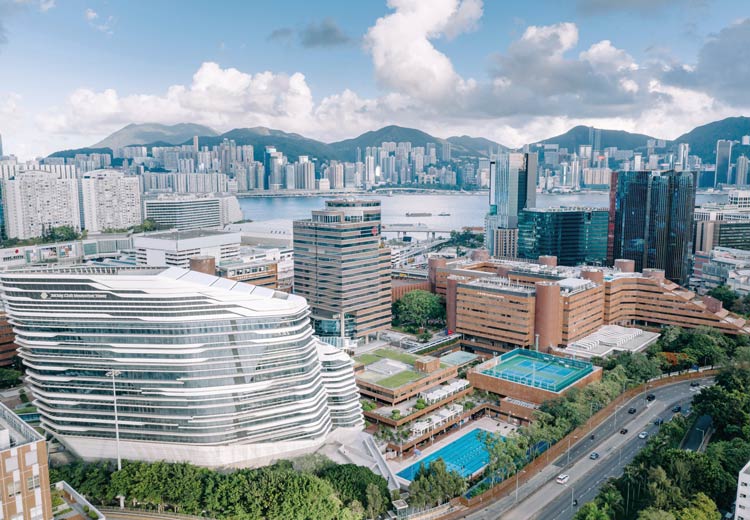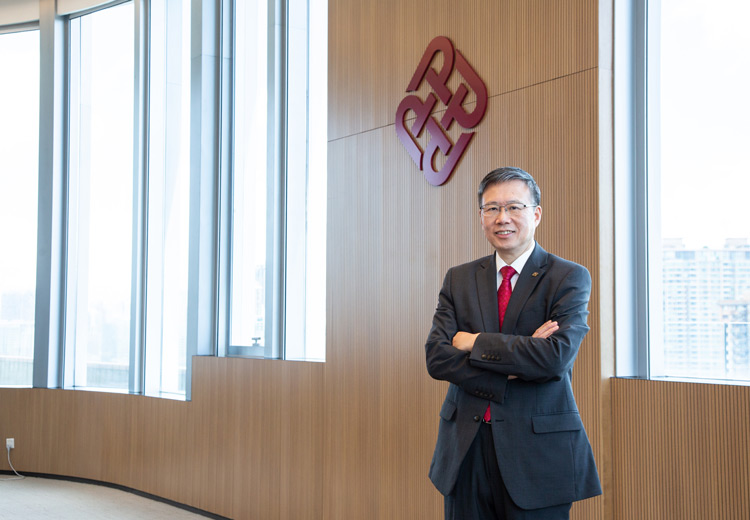Driving innovation and positive societal impact around the world

Sponsored by

Sponsored by

The Hong Kong Polytechnic University emphasises holistic student development and mission-driven interdisciplinary research to address societal needs
The Hong Kong Polytechnic University (PolyU) seeks to advance industrial and socioeconomic development in Hong Kong and beyond through its educational, research and knowledge transfer initiatives. In an interview with Times Higher Education, Jin-Guang Teng, president of PolyU, delves into the university’s unique strengths and contributions to society over the years.
What areas and academic disciplines does PolyU excel in?
Our university enjoys a strong reputation in engineering, technology and related subjects, and we have a long and proud history in these fields. But our expertise doesn’t stop there.
We’re also well-known for our leading position in various distinct disciplines, which are basically unique among the eight publicly funded universities in Hong Kong, such as design, fashion and textiles, hotel and tourism management, rehabilitation sciences and optometry, among others.
By excelling in the provision of disciplines that closely match societal and industrial needs, such as those mentioned above, we’ve made significant contributions to the socioeconomic development of Hong Kong, mainland China and the world. In fact, over the years, we’ve guided almost half a million students to graduation – far more than any other university in Hong Kong.
We are glad that our dedication to academic excellence has received international recognition, with the 2023 Times Higher Education Young University Rankings placing us fourth worldwide. While we’re honoured by this recognition, we remain focused on our core mission: to be an innovative world-class university that directly benefits society.
How does the PolyU Academy for Interdisciplinary Research support PolyU’s commitment to interdisciplinary research?
Our university is committed to producing research that transcends academia and addresses the world’s most pressing challenges, reflected by our university’s motto, “To learn and to apply, for the benefit of mankind”. It is with this goal in mind that we established the PolyU Academy for Interdisciplinary Research (PAIR), a collaborative research platform that brings together resources and expertise from different disciplines to deliver game-changing solutions to key societal issues.
With 16 research institutes and centres, as well as more than 400 senior researchers, PAIR is one of the largest research platforms of its kind in Hong Kong and the Greater Bay Area. PAIR pursues mission-driven interdisciplinary research in areas of socioeconomic importance, such as smart cities, carbon-neutral development, new energy development, artificial intelligence, advanced manufacturing, mental health and deep space exploration.
Through PAIR, we aspire to contribute to the United Nations’ Sustainable Development Goals, including those related to promoting health and well-being, affordable and clean energy and sustainable cities and communities.

Jin-Guang Teng, president of PolyU
Can you talk about some notable projects and achievements at PolyU?
We are the only university in Hong Kong that has made significant contributions to national space missions. By leveraging our scientific and technological excellence, we developed a sophisticated space instrument, the Surface Sampling and Packing System for the Chang’e-5 lunar sample-return mission.
We also identified possible landing regions with advanced topographic mapping and geomorphological analysis technologies, as well as developed the Mars Landing Surveillance Camera for the Tianwen-1 Mars exploration mission.
In an excellent example of knowledge transfer for the benefit of society, we have helped with the mitigation of myopia, which is a common eye disorder that affects around 9 out of 10 young adults in East Asia. In particular, we have developed myopia control technologies – known as DISC and DIMS – to produce advanced contact and spectacle lenses that can slow the rate of myopia progression by around 60 per cent.
The lenses have been commercialised in collaboration with our industry partner Hoya Vision Care and a PolyU academic-led start-up, Vision Science and Technology. Over 16 million pieces have been sold so far.
How does PolyU contribute to innovation and technology development in Hong Kong and beyond?
One of our core contributions is nurturing a pool of interdisciplinary talents who can be leading players in the emerging innovation and technology industries of Hong Kong, the Greater Bay Area and beyond.
To foster these talents, we have strengthened our undergraduate curriculum to include the mandatory components of artificial intelligence and data analytics as well as innovation and entrepreneurship, empowering students with digital and data literacy and the innovative mindset required to thrive in today’s Industry 4.0 era.
At the postgraduate level, we are introducing a number of cutting-edge master’s degree programmes in areas such as Metaverse technology, microelectronics technology and materials, sustainable technology for carbon neutrality, ESG [environmental, social and governance] and sustainability, and intelligent construction.
Last year, we launched a master’s degree in blockchain technology. These programmes are designed to develop technologically astute talents, equipping them not only to navigate the current technological landscape but also to shape the future of innovation.
How does PolyU prepare graduates to meet society’s changing needs through holistic education?
A key aspect of our holistic approach to education is that, in addition to giving students professional and academic knowledge, we also nurture a strong sense of social responsibility, integrity and affection for their nation and the global community. Cultivating such values in students is important because, to address the most pressing societal issues, professional expertise alone is not enough.
The next generation must have a strong passion to employ their professional expertise in a way that makes a positive contribution to society. That is why we were the first university in Hong Kong to make service learning a mandatory component of the undergraduate curriculum, allowing students to apply their professional knowledge to support communities in need around the world.
Since our service-learning initiative was established in 2012, more than 33,000 PolyU students have provided over 1.33 million hours of service to communities in need in Hong Kong, mainland China and beyond. Our university was proud to receive the Teaching and Learning Strategy of the Year award at the 2022 Times Higher Education Awards Asia for our service-learning initiative.
We also provide ethical leadership education as a compulsory element for undergraduates, through courses such as Tomorrow’s Leaders, which focuses on enhancing qualities like morality, integrity and leadership in students.
"The next generation must have a strong passion to employ their professional expertise in a way that makes a positive contribution to society"
Jin-Guang Teng, president of PolyU
How does PolyU nurture the next generation of scholars?
In addition to providing world-class postgraduate education through our Graduate School, we are committed to developing the research capabilities and analytical skills of students from the undergraduate level, giving them a solid foundation to develop their careers as successful researchers and scholars who can contribute to societal needs.
That is why we introduced the Undergraduate Research and Innovation Scheme (URIS), which aims to strengthen academic curiosity and enquiry-based learning among undergraduate students.
Under the URIS, students are given opportunities and funding to undertake research projects under the guidance and supervision of experienced scholars. They are also granted admission to our virtual College of Undergraduate Researchers and Innovators, which further supports their research training.
Since the launch of the URIS in 2021, our university has granted more than HKD 13 million (£1.3 million) to over 410 outstanding undergraduate students to undertake research projects.
By cultivating a research mindset early on, we empower students to ask deeper questions, think critically and contribute innovative solutions to real-world problems.
Find out more about the Hong Kong Polytechnic University.